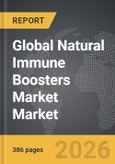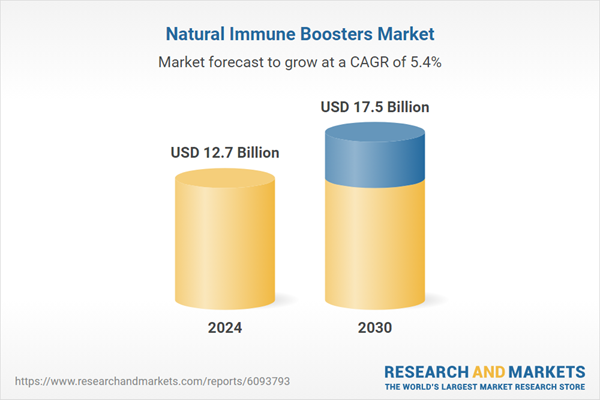Global Natural Immune Boosters Market - Key Trends & Drivers Summarized
Why Are Natural Immune Boosters Becoming Mainstream in Preventive Health?
Natural immune boosters have transitioned from niche supplements to mainstream health essentials, driven by heightened public awareness around disease prevention and holistic wellness. These products, which include botanicals, vitamins, minerals, probiotics, and adaptogens, are valued for their ability to support the body's innate defense systems. The global pandemic significantly accelerated this shift, highlighting the role of daily immunity maintenance rather than reactive treatment. As consumers seek safer, long-term health strategies, naturally derived immune support supplements are increasingly favored over synthetic pharmaceuticals.The appeal lies in their perceived safety, lower incidence of side effects, and alignment with clean-label, plant-based, and organic lifestyle preferences. Functional ingredients like echinacea, elderberry, turmeric, ginger, zinc, and vitamin C have seen surging demand, backed by a growing body of scientific studies on their immunomodulatory effects. Moreover, immune health is no longer confined to traditional medicine cabinets - it's now embedded in food, beverages, and personal care products, reflecting a broader, lifestyle-oriented view of immunity.
How Are Formulation Trends and Delivery Formats Evolving?
Innovation in product formulation and delivery is reshaping how consumers access and engage with natural immune boosters. The market has moved far beyond tablets and capsules to include gummies, effervescent powders, fortified beverages, lozenges, herbal teas, and functional foods. These new formats improve compliance, convenience, and user experience, especially among children, seniors, and consumers with pill fatigue. Brand differentiation now hinges not only on ingredient purity but also on bioavailability, taste, and multifunctionality.Scientific innovation is also contributing to more targeted and potent formulations. Liposomal encapsulation and nanotechnology are being leveraged to enhance nutrient absorption and prolong efficacy. Synergistic blends that combine immunity with stress reduction, gut health, and energy support are gaining popularity, reflecting consumer demand for holistic health solutions. Additionally, the use of adaptogenic herbs - like ashwagandha, reishi mushroom, and astragalus - is expanding, as these ingredients support immune resilience under chronic stress, a growing concern in modern lifestyles.
Which End-Use Channels and Consumer Segments Are Expanding Most Rapidly?
The end-use landscape for natural immune boosters is widening, with retail distribution now encompassing pharmacies, health stores, online platforms, grocery chains, and even fitness studios. E-commerce has emerged as a dominant sales channel, particularly among urban consumers seeking tailored wellness regimens and direct-to-door delivery. Subscription models, personalized nutrition plans, and AI-driven supplement recommendations are redefining how immune health products are marketed and consumed.Demographically, the core user base is expanding from health-conscious adults to include children, athletes, and aging populations. Pediatric immune health products are gaining traction in response to parental concerns over antibiotic overuse and recurrent infections. In the elderly segment, immune boosters are often integrated into daily regimens to support vaccine efficacy and resistance to respiratory illnesses. Even workplace wellness programs are beginning to incorporate immune support into employee health offerings, recognizing the link between immunity, productivity, and absenteeism.
What Factors Are Driving Growth in the Natural Immune Boosters Market?
The growth in the natural immune boosters market is driven by several interconnected factors spanning technological innovation, shifting end-user behavior, and macro health trends. A primary driver is the global move toward preventive health and self-care, with consumers actively seeking solutions that build long-term resilience rather than offering short-term relief. The expansion of clean-label formulations and plant-based ingredients is aligning closely with these values, reinforcing market trust and sustained consumption.End-use diversification across dietary supplements, fortified foods, functional beverages, and wellness products is broadening revenue streams and enabling cross-category innovation. Regulatory relaxation in several regions for traditional and herbal remedies has also facilitated quicker product launches and wider availability. Moreover, clinical research supporting the efficacy of natural ingredients is enhancing consumer confidence and enabling premium positioning of scientifically backed products.
Digital health integration is another accelerator, as apps and platforms now guide users toward personalized immune health regimens based on biomarkers, lifestyle, and genetics. The intersection of nutraceutical science, consumer tech, and lifestyle wellness is creating a robust demand cycle that transcends seasonal flu awareness and responds to year-round immune optimization needs. These converging dynamics are positioning natural immune boosters as a central pillar in the evolving global health and wellness economy.
Report Scope
The report analyzes the Natural Immune Boosters market, presented in terms of market value (US$). The analysis covers the key segments and geographic regions outlined below:- Segments: Product Type (Herbal Supplements, Vitamins & Minerals, Probiotics, Functional Foods & Beverages, Essential Oils); Distribution Channel (Health Food Stores, Online Retailers, Pharmacies & Drug Stores, Supermarkets / Hypermarkets, Other Distribution Channels); Application (Immune System Support, Cold & Flu Relief, Allergy Management, Respiratory Health, Digestive Health, Other Applications).
- Geographic Regions/Countries: World; United States; Canada; Japan; China; Europe (France; Germany; Italy; United Kingdom; Spain; Russia; and Rest of Europe); Asia-Pacific (Australia; India; South Korea; and Rest of Asia-Pacific); Latin America (Argentina; Brazil; Mexico; and Rest of Latin America); Middle East (Iran; Israel; Saudi Arabia; United Arab Emirates; and Rest of Middle East); and Africa.
Key Insights:
- Market Growth: Understand the significant growth trajectory of the Herbal Supplements segment, which is expected to reach US$7.2 Billion by 2030 with a CAGR of a 5.7%. The Vitamins & Minerals segment is also set to grow at 4% CAGR over the analysis period.
- Regional Analysis: Gain insights into the U.S. market, valued at $3.5 Billion in 2024, and China, forecasted to grow at an impressive 8.6% CAGR to reach $3.5 Billion by 2030. Discover growth trends in other key regions, including Japan, Canada, Germany, and the Asia-Pacific.
Why You Should Buy This Report:
- Detailed Market Analysis: Access a thorough analysis of the Global Natural Immune Boosters Market, covering all major geographic regions and market segments.
- Competitive Insights: Get an overview of the competitive landscape, including the market presence of major players across different geographies.
- Future Trends and Drivers: Understand the key trends and drivers shaping the future of the Global Natural Immune Boosters Market.
- Actionable Insights: Benefit from actionable insights that can help you identify new revenue opportunities and make strategic business decisions.
Key Questions Answered:
- How is the Global Natural Immune Boosters Market expected to evolve by 2030?
- What are the main drivers and restraints affecting the market?
- Which market segments will grow the most over the forecast period?
- How will market shares for different regions and segments change by 2030?
- Who are the leading players in the market, and what are their prospects?
Report Features:
- Comprehensive Market Data: Independent analysis of annual sales and market forecasts in US$ Million from 2024 to 2030.
- In-Depth Regional Analysis: Detailed insights into key markets, including the U.S., China, Japan, Canada, Europe, Asia-Pacific, Latin America, Middle East, and Africa.
- Company Profiles: Coverage of players such as BioBag International AS, Celanese Corporation, CloudFlex Film, Daicel Corporation, Emco Industrial Plastics, Inc. and more.
- Complimentary Updates: Receive free report updates for one year to keep you informed of the latest market developments.
Some of the 32 companies featured in this Natural Immune Boosters market report include:
- Agenus Inc.
- Amway Corporation
- ASEA
- BioNTech SE
- Blackmores Limited
- Dabur India Ltd.
- Elysium Health
- Gaia Herbs
- Garden of Life
- GNC Holdings, LLC
- Grifols, S.A.
- Herbalife Nutrition Ltd.
- Himalaya Wellness
- MegaFood
- Nature's Way
- New Chapter
- Novavax, Inc.
- NOW Foods
- Solgar
- Swisse Wellness
This edition integrates the latest global trade and economic shifts into comprehensive market analysis. Key updates include:
- Tariff and Trade Impact: Insights into global tariff negotiations across 180+ countries, with analysis of supply chain turbulence, sourcing disruptions, and geographic realignment. Special focus on 2025 as a pivotal year for trade tensions, including updated perspectives on the Trump-era tariffs.
- Adjusted Forecasts and Analytics: Revised global and regional market forecasts through 2030, incorporating tariff effects, economic uncertainty, and structural changes in globalization. Includes historical analysis from 2015 to 2023.
- Strategic Market Dynamics: Evaluation of revised market prospects, regional outlooks, and key economic indicators such as population and urbanization trends.
- Innovation & Technology Trends: Latest developments in product and process innovation, emerging technologies, and key industry drivers shaping the competitive landscape.
- Competitive Intelligence: Updated global market share estimates for 2025, competitive positioning of major players (Strong/Active/Niche/Trivial), and refined focus on leading global brands and core players.
- Expert Insight & Commentary: Strategic analysis from economists, trade experts, and domain specialists to contextualize market shifts and identify emerging opportunities.
Table of Contents
Companies Mentioned (Partial List)
A selection of companies mentioned in this report includes, but is not limited to:
- Agenus Inc.
- Amway Corporation
- ASEA
- BioNTech SE
- Blackmores Limited
- Dabur India Ltd.
- Elysium Health
- Gaia Herbs
- Garden of Life
- GNC Holdings, LLC
- Grifols, S.A.
- Herbalife Nutrition Ltd.
- Himalaya Wellness
- MegaFood
- Nature's Way
- New Chapter
- Novavax, Inc.
- NOW Foods
- Solgar
- Swisse Wellness
Table Information
| Report Attribute | Details |
|---|---|
| No. of Pages | 386 |
| Published | February 2026 |
| Forecast Period | 2024 - 2030 |
| Estimated Market Value ( USD | $ 12.7 Billion |
| Forecasted Market Value ( USD | $ 17.5 Billion |
| Compound Annual Growth Rate | 5.4% |
| Regions Covered | Global |









